六年级英语上册知识点版完美版
六年级英语上册知识点总结
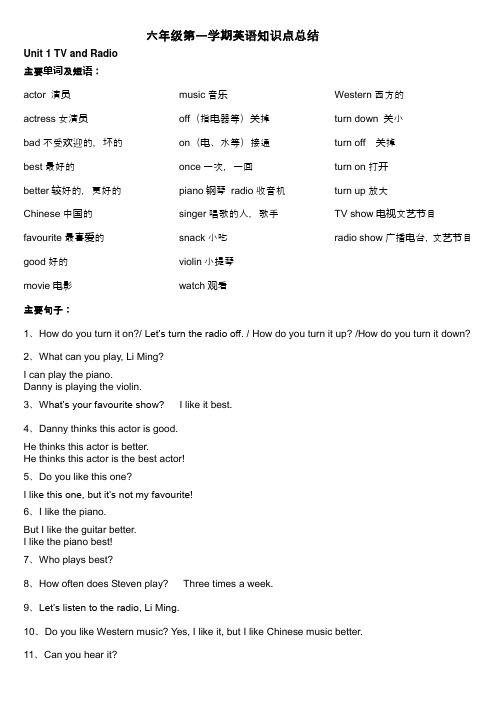
六年级第一学期英语知识点总结Unit 1 TV and Radio主要单词及短语:actor 演员actress女演员bad不受欢迎的,坏的best最好的better较好的,更好的Chinese中国的favourite最喜爱的good好的movie电影music音乐off(指电器等)关掉on(电、水等)接通once一次,一回piano钢琴radio收音机singer唱歌的人,歌手snack小吃violin小提琴watch观看Western西方的turn down 关小turn off 关掉turn on打开turn up放大TV show电视文艺节目radio show广播电台,文艺节目主要句子:1、How do you turn it on?/ Let’s turn the radio off. / How do you turn it up? /How do you turn it down?2、What can you play, Li Ming?I can play the piano.Danny is playing the violin.3、What’s your favourite show?I like it best.4、Danny thinks this actor is good.He thinks this actor is better.He thinks this actor is the best actor!5、Do you like this one?I like this one, but it’s not my favourite!6、I like the piano.But I like the guitar better.I like the piano best!7、Who plays best?8、How often does Steven play? Three times a week.9、Let’s listen to the radio, Li Ming.10、Do you like Western music? Yes, I like it, but I like Chinese music better.11、Can you hear it?12、Why is the radio playing Chinese music?13、Thanks for finding this radio show.14、Dinosaurs and people are different. I think dinosaurs and people are the same.15、What did you like best?I liked the dinosaur better than the rabbit, but I liked the snacks best.16、They order some food.17、Jenny wants Western food. “I would like a hamburger, French fries and milk, please.”18、I would like some Chinese food, please. I would like some noodles, dumplings and tea.19、There are many people at the restaurant.20、I can’t hear her. I can’t hear her either.重点语法复习:绝大多数形容词有三种形式,原级,比较级和最高级, 以表示形容词说明的性质在程度上的不同。
人教版六年级上册英语知识点汇总
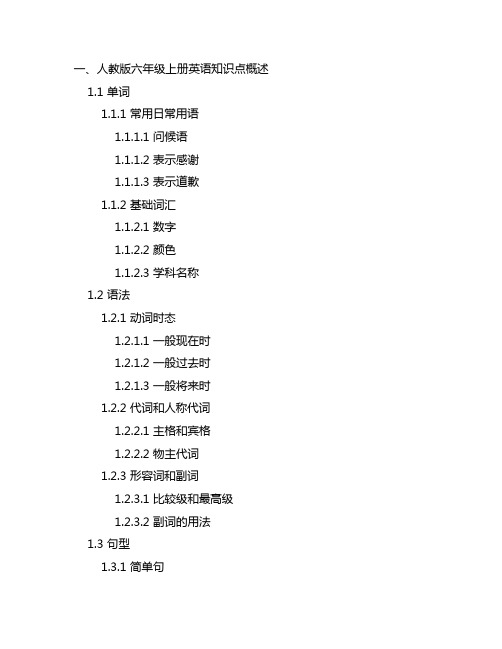
一、人教版六年级上册英语知识点概述1.1 单词1.1.1 常用日常用语1.1.1.1 问候语1.1.1.2 表示感谢1.1.1.3 表示道歉1.1.2 基础词汇1.1.2.1 数字1.1.2.2 颜色1.1.2.3 学科名称1.2 语法1.2.1 动词时态1.2.1.1 一般现在时1.2.1.2 一般过去时1.2.1.3 一般将来时1.2.2 代词和人称代词1.2.2.1 主格和宾格1.2.2.2 物主代词1.2.3 形容词和副词1.2.3.1 比较级和最高级1.2.3.2 副词的用法1.3 句型1.3.1 简单句1.3.1.1 肯定句1.3.1.2 否定句1.3.1.3 疑问句1.3.2 复合句1.3.2.1 并列句1.3.2.2 定语从句1.3.2.3 状语从句二、人教版六年级上册英语知识点详解2.1 单词2.1.1 常用日常用语2.1.1.1 问候语问候语是指在英语日常交际中用于打招呼和示好的常用词汇,包括Hello、Hi、Good morning、Good afternoon等等。
2.1.1.2 表示感谢表示感谢的常用词汇有Thank you、Thanks a lot、Thank you very much等,用于表达对别人的帮助或礼物表示感激之情。
2.1.1.3 表示道歉表示道歉的词汇包括I'm sorry、Excuse me、Pardon等,在日常生活中,用于向别人道歉或请求对方让步的场合。
2.1.2 基础词汇2.1.2.1 数字数字是英语基础词汇的重要部分,包括基本的数字表达方式和计量单位,如one、two、three等,以及hundred、thousand等。
2.1.2.2 颜色颜色是描述事物外观的重要词汇,在日常交流中也经常用到,包括red、blue、yellow等常见颜色词汇。
2.1.2.3 学科名称学科名称涉及到人们日常生活和学习工作的方方面面,包括mathematics、music、art等,是学习英语时必须掌握的词汇。
部编版六年级上册英语全册知识点考点归纳

部编版六年级上册英语全册知识点考点归纳一. Unit 1: Greetings and Introductions- 主要知识点:问候语和自我介绍的表达方式、对话中的礼貌用语等。
- 考点:熟练运用问候语和自我介绍的句型进行实际对话。
二. Unit 2: Daily Routines- 主要知识点:日常活动及时间的表达法、动词的第三人称单数形式、频度副词等。
- 考点:能够描述自己和他人的日常活动,并用适当的频度副词表达频率。
三. Unit 3: Hobbies and Interests- 主要知识点:各类爱好和兴趣的词汇,运动动词的搭配等。
- 考点:能够谈论自己的爱好和兴趣,并用动词的适当形式表达。
四. Unit 4: School Life- 主要知识点:学校生活相关的词汇、句型及日常用语。
- 考点:根据提供的情境,能流利用英语进行交流,描述学校生活的一般情况。
五. Unit 5: Family and Homes- 主要知识点:家庭成员及房屋相关的词汇、形容词的比较级和最高级等。
- 考点:描述家庭成员和房屋的外貌、特点及家人之间的关系,掌握形容词的比较级和最高级的使用。
六. Unit 6: Daily Life- 主要知识点:购物和衣物相关的词汇、句型及日常用语等。
- 考点:能够根据给定的情境,进行购物和衣物方面的交流,描述自己和他人的穿着。
七. Unit 7: Food and Drinks- 主要知识点:食物和饮料相关的词汇、数量词、可数名词和不可数名词等。
- 考点:能够描述所喜欢的食物和饮料,并用数量词正确表达数量。
八. Unit 8: Festivals and Celebrations- 主要知识点:节日和庆祝活动的词汇、句型及常用表达方式等。
- 考点:能够流利描述不同节日和庆祝活动,并参与与之相关的英语对话。
以上是部编版六年级上册英语全册的知识点和考点归纳。
希望对你的学习有帮助!。
小学六年级上册英语知识点归纳总结
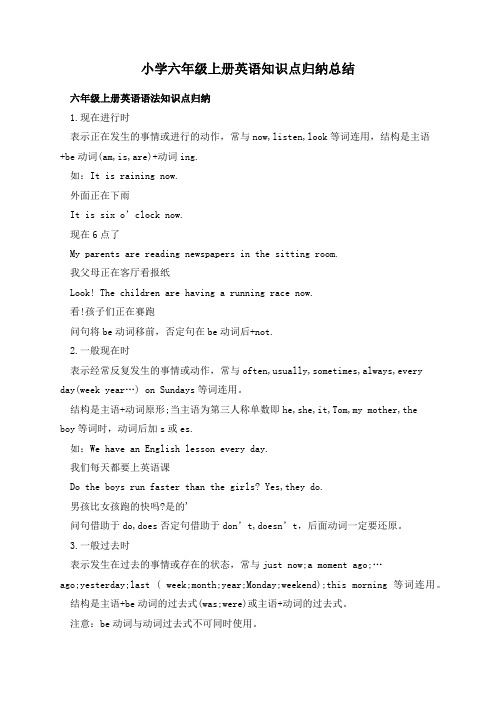
小学六年级上册英语知识点归纳总结六年级上册英语语法知识点归纳1.现在进行时表示正在发生的事情或进行的动作,常与now,listen,look等词连用,结构是主语+be动词(am,is,are)+动词ing.如:It is raining now.外面正在下雨It is six o’clock now.现在6点了My parents are reading newspapers in the sitting room.我父母正在客厅看报纸Look! The children are having a running race now.看!孩子们正在赛跑问句将be动词移前,否定句在be动词后+not.2.一般现在时表示经常反复发生的事情或动作,常与often,usually,sometimes,always,every day(week year…) on Sundays等词连用。
结构是主语+动词原形;当主语为第三人称单数即he,she,it,Tom,my mother,theboy等词时,动词后加s或es.如:We have an English lesson every day.我们每天都要上英语课Do the boys run faster than the girls? Yes,they do.男孩比女孩跑的快吗?是的'问句借助于do,does否定句借助于don’t,doesn’t,后面动词一定要还原。
3.一般过去时表示发生在过去的事情或存在的状态,常与just now;a moment ago;…ago;yesterday;last ( week;month;year;Monday;weekend);this morning等词连用。
结构是主语+be动词的过去式(was;were)或主语+动词的过去式。
注意:be动词与动词过去式不可同时使用。
如:My earphones were on the ground just now.我的耳机刚刚还在呢。
小学六年级英语上册知识点整理

小学六年级英语上册知识点整理1.语法知识点- 时态:一般现在时、一般过去时、一般将来时- 句型:陈述句、疑问句、否定句、祈使句- 提问:特殊疑问词的使用(What。
Where。
When。
Why。
Who。
Whose。
How等)- 动词:动词的基本形式、动词的过去式、动词的进行时- 名词:可数名词、不可数名词、单数形式和复数形式的变化- 形容词:形容词的基本形式、形容词的比较级和最高级- 副词:副词在句中的位置- 介词:常用介词的使用(in。
on。
at。
by。
with等)- 冠词:冠词的使用(a。
an。
the)- 连词:and。
but。
or的使用2.词汇知识点- 数字:1-100的基本数字表达,以及相关的算术运算词汇- 天气:常见的天气词汇(sunny。
rainy。
windy等)- 季节:春、夏、秋、冬四个季节的英文表达- 颜色:常见的基本颜色词汇(red。
blue。
green等)- 学科:英语、数学、音乐等学科的英文表达- 动物:常见的动物名称(dog。
cat。
bird等)- 蔬菜和水果:常见的蔬菜和水果名称(carrot。
apple。
banana 等)- 地点:常见的地点名称(school。
park。
supermarket等)- 人物:常见的人物角色(teacher。
student。
friend等)3.日常用语知识点- 问候与回应:常用的问候语和回应语(Good morning。
How are you?等)- 自我介绍:自我介绍的基本句型和常用词汇- 家庭成员:家庭成员的英文表达(father。
mother。
brother等)- 个人信息:年龄、姓名、国籍等个人信息的英文表达- 时间:表达时间的基本句型和常用词汇(hour。
minute。
o'clock等)- 打电话用语的基本句型和常用词汇- 交通工具:常见的交通工具名称(bus。
car。
bike等)- 食物和饮品:常见的食物和饮品名称(rice。
六年级英语上册重点知识归纳

六年级英语重点知识归纳六年级英语上册重点知识归纳一、一般现在时1.概念:表示经常性、习惯性的动作,常与always等连用。
2. 用法:(1)常见的动词:go,come,leave,play,do,watch,see,read,study,write等。
(2)动词的第三人称单数:以o,e,s,x,ch,sh结尾的动词加es,辅音字母加y的动词,把y去掉。
如:goes,ives,buys,plays,watchs, sees, reads,writhes。
(3)句型:肯定句:主语+动词原形+其他主语+be+其他否定句:主语+don’t+动词原形+其他主语+be+not+其他一般疑问句:Do+主语+动词原形+其他?特殊疑问句:疑问词+do+主语+动词原形+其他?二、现在进行时1.概念:表示正在发生的动作。
2.用法:(1)常见的动词:be,run,walk,dance,eat,write,watch,see,read等。
(2)结构:主语+be+动词的ing+其他肯定句:主语+be+动词的ing+其他否定句:主语+don’t+动词原形+其他一般疑问句:Be+主语+动词原形+其他?特殊疑问句:疑问词+be+主语+动词原形+其他?三、一般过去时1.概念:表示过去发生的动作或存在的状态。
2.用法:(1)常见的动词:go,come,leave,play,do,watch,see,read,study,write等。
(2)动词的过去式:以ow,ay,io结尾的动词加ed,如:grew, cleaned,adopted。
其他结尾的动词减去词尾的e再加上ed,如:went-went-went,offered-offered-offered。
(3)句型:肯定句:主语+动词过去式+其他主语+was/were+其他否定句:主语+don’t/didn’t+动词原形+其他主语+was/were+not+其他一般疑问句:Did+主语+动词原形+其他?特殊疑问句:疑问词+did+主语+动词原形+其他?四、现在完成时1.概念:表示过去发生的动作对现在造成的影响或结果。
(完整版)人教版六年级英语上册各单元知识点汇总,推荐文档
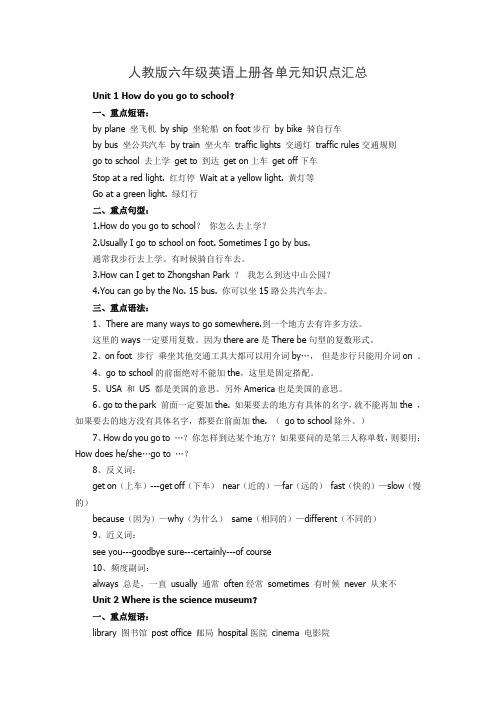
人教版六年级英语上册各单元知识点汇总Unit 1 How do you go to school?一、重点短语:by plane 坐飞机by ship 坐轮船on foot步行by bike 骑自行车by bus 坐公共汽车by train 坐火车traffic lights 交通灯traffic rules交通规则go to school 去上学get to 到达get on上车get off下车Stop at a red light. 红灯停Wait at a yellow light. 黄灯等Go at a green light. 绿灯行二、重点句型:1.How do you go to school?你怎么去上学?ually I go to school on foot. Sometimes I go by bus.通常我步行去上学。
有时候骑自行车去。
3.How can I get to Zhongshan Park ?我怎么到达中山公园?4.You can go by the No. 15 bus. 你可以坐15路公共汽车去。
三、重点语法:1、There are many ways to go somewhere.到一个地方去有许多方法。
这里的ways一定要用复数。
因为there are是There be句型的复数形式。
2、on foot 步行乘坐其他交通工具大都可以用介词by…,但是步行只能用介词on 。
4、go to school的前面绝对不能加the,这里是固定搭配。
5、USA 和US 都是美国的意思。
另外America也是美国的意思。
6、go to the park 前面一定要加the. 如果要去的地方有具体的名字,就不能再加the ,如果要去的地方没有具体名字,都要在前面加the. (go to school除外。
)7、How do you go to …?你怎样到达某个地方?如果要问的是第三人称单数,则要用:How does he/she…go to …?8、反义词:get on(上车)---get off(下车)near(近的)—far(远的)fast(快的)—slow(慢的)because(因为)—why(为什么)same(相同的)—different(不同的)9、近义词:see you---goodbye sure---certainly---of course10、频度副词:always 总是,一直usually 通常often经常sometimes 有时候never 从来不Unit 2 Where is the science museum?一、重点短语:library 图书馆post office 邮局hospital医院cinema 电影院bookstore书店science museum科学博物馆turn left向左转turn right 向右转go straight 直行north北south南east东west西next to靠近、与……。
人教精通版小学英语六年级上册单元知识点总结(全册)(完美版)

Unit1Igotoschoolat8:00.一、核心词汇1.描述日常活动的词汇cleanthewindow擦窗户cleanthedoor擦门cleanthefloor擦地板2.描述三餐的词汇breakfast早餐lunch午餐dinner晚餐3.描述时间的词汇morning早晨afternoon下午evening晚上; 傍晚4.频率副词often时常; 常常5.其他walk走; 步行every每一个easy容易difficult困难二、拓展词组描述日常活动的词组getup起床havebreakfast吃早餐gotoschool去上学havelunch吃午饭gohome回家havedinner吃晚饭watchTV看电视gotobed睡觉cookbreakfast做早餐teachEnglish教英语takeawalk散步readstories读故事seeafilm看电影playthepiano弹钢琴三、核心句型1.Igetupat7:30inthemorning. 我早晨七点半起床。
解读:此句是一个陈述句, 用来描述我在某一时刻所做的事情。
举一反三:Igotoschoolat8:00inthemorning. 我早晨八点去上学。
她不在上午六点半起床。
2.Shedoesn’tgetupat6:30inthemorning.解读: 此句是一个否定句, 用来描述某人在某一时刻没有做的事情。
举一反三:Shedoesn’tgetupat6:40.她不在六点四十分起床。
3.— WhatdoyoudoonSaturdays? 你星期六做什么?— Ioftengoandseeafilmwithmyparents. 我经常和我的父母一起去看电影。
解读:这是用来询问对方某天做什么及其回答的句子。
举一反三:— Whatdoyoudoontheweekend? 你周末做什么?— Ioftendohomework. 我经常做作业。
PEP初中英语六年级上册知识点归纳
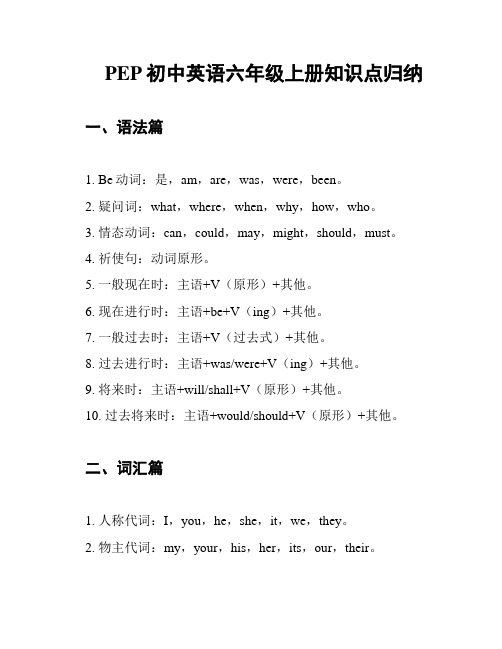
PEP初中英语六年级上册知识点归纳一、语法篇1. Be动词:是,am,are,was,were,been。
2. 疑问词:what,where,when,why,how,who。
3. 情态动词:can,could,may,might,should,must。
4. 祈使句:动词原形。
5. 一般现在时:主语+V(原形)+其他。
6. 现在进行时:主语+be+V(ing)+其他。
7. 一般过去时:主语+V(过去式)+其他。
8. 过去进行时:主语+was/were+V(ing)+其他。
9. 将来时:主语+will/shall+V(原形)+其他。
10. 过去将来时:主语+would/should+V(原形)+其他。
二、词汇篇1. 人称代词:I,you,he,she,it,we,they。
2. 物主代词:my,your,his,her,its,our,their。
3. 形容词:big,small,long,short,tall,fat,thin,heavy,light,old,young。
4. 副词:often,seldom,always,never,sometimes,very,too,so,quite。
5. 数词:序数词(first,second,third)和基数词(one,two,three)。
6. 时间词:week,month,year,morning,afternoon,evening,night。
7. 颜色词:red,green,blue,yellow,white,black。
8. 动词:play,listen,watch,read,write,swim,dance,sing,draw,speak。
9. 名词:book,desk,chair,table,bed,door,window,picture,pen,ruler,bottle,bag,pencil case。
三、对话篇3. Talking about family: How many people are there in your family? What do your parents do?4. Talking about hobbies: Do you like…? What’s your favourite…?5. Talking about school: What subjects do you study at school? Who’s your favourite teacher?6. Talking about daily routines: What time do you get up/go to bed? What do you do on weekends?希望以上知识点归纳对您有所帮助。
6年级上册英语重点知识
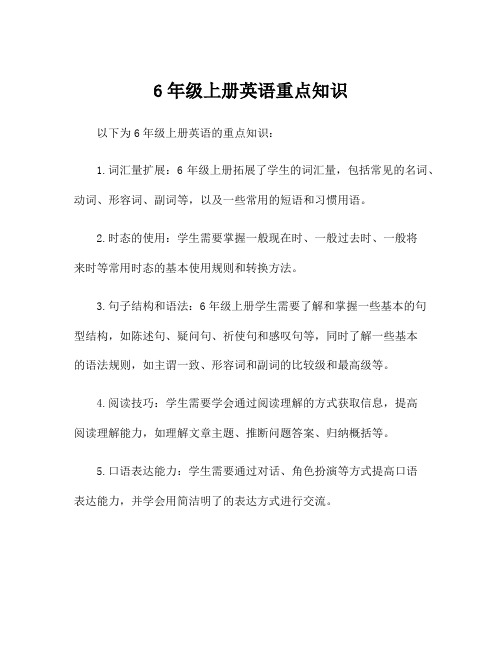
6年级上册英语重点知识
以下为6年级上册英语的重点知识:
1.词汇量扩展:6年级上册拓展了学生的词汇量,包括常见的名词、动词、形容词、副词等,以及一些常用的短语和习惯用语。
2.时态的使用:学生需要掌握一般现在时、一般过去时、一般将
来时等常用时态的基本使用规则和转换方法。
3.句子结构和语法:6年级上册学生需要了解和掌握一些基本的句型结构,如陈述句、疑问句、祈使句和感叹句等,同时了解一些基本
的语法规则,如主谓一致、形容词和副词的比较级和最高级等。
4.阅读技巧:学生需要学会通过阅读理解的方式获取信息,提高
阅读理解能力,如理解文章主题、推断问题答案、归纳概括等。
5.口语表达能力:学生需要通过对话、角色扮演等方式提高口语
表达能力,并学会用简洁明了的表达方式进行交流。
请注意,以上仅是六年级上册英语的一般知识点,具体的重点知识可能因教材和学校的不同而有所差异,请以实际教材和教学要求为准。
英语六年级上册必考知识点
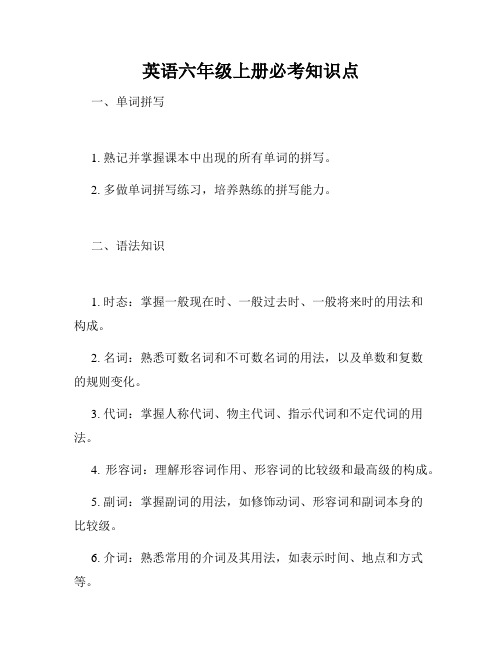
英语六年级上册必考知识点一、单词拼写1. 熟记并掌握课本中出现的所有单词的拼写。
2. 多做单词拼写练习,培养熟练的拼写能力。
二、语法知识1. 时态:掌握一般现在时、一般过去时、一般将来时的用法和构成。
2. 名词:熟悉可数名词和不可数名词的用法,以及单数和复数的规则变化。
3. 代词:掌握人称代词、物主代词、指示代词和不定代词的用法。
4. 形容词:理解形容词作用、形容词的比较级和最高级的构成。
5. 副词:掌握副词的用法,如修饰动词、形容词和副词本身的比较级。
6. 介词:熟悉常用的介词及其用法,如表示时间、地点和方式等。
7. 动词:了解动词的原形、过去式和过去分词的构成规则。
8. 人称代词和动词的一致性:掌握人称代词与动词之间的一致关系。
三、句型转换1. 肯定句转变为否定句和疑问句:掌握否定句和一般疑问句的构成规则。
2. 一般疑问句转变为肯定句和否定句:掌握回答一般疑问句的肯定和否定形式。
四、阅读理解1. 熟练阅读课本中的短文,并理解主旨内容。
2. 掌握从短文中获取关键信息的技巧,如寻找细节和推理等。
3. 培养阅读理解的速度和准确性,多做阅读练习。
五、写作能力1. 能够运用学到的基础词汇和语法知识,写出简单的句子和段落。
2. 培养表达思想的能力,逐渐提高写作的准确性和流畅性。
六、听力技巧1. 听力理解:提高听力的准确性和处理信息的能力。
2. 听写能力:提高听写的准确性和速度,注意拼写正确。
以上就是英语六年级上册必考的知识点汇总,希望同学们在备考过程中能够重点关注这些内容,加强基础,提高自身的英语水平。
祝大家取得好成绩!。
六年级上册英语知识点归纳完整版本

六年级上册英语知识点归纳完整版本Unit 1 The King's New ClothesThe story of "The King's New Clothes" is a classic tale that has been told for ns。
It is a story about a vain and foolish king who is tricked into believing that he is wearing a magnificent set of clothes。
when in reality。
he is wearing nothing at all.In the past tense。
the simple past tense is used to describe ns or states that occurred in the past。
The simple past tense can be formed using the past tense of the verb "to be" (was/were) or the past tense of other verbs.For example。
"I was ill yesterday" or "The boys were happy last weekend" use the past tense of "to be" to describe a state in the past。
"She went shopping last Sunday" or "I caught a big fish on the farm last weekend" use the past tense of other verbs to describe past ns.In affirmative sentences。
pep六年级上册英语所有重点语法知识点

pep六年级上册英语所有重点语法知识点摘要:1.名词2.冠词3.代词4.介词5.动词6.形容词7.副词8.句子结构9.疑问句和否定句10.宾语从句11.状语从句12.同位语从句13.感叹句14.条件句15.祈使句16.动词时态17.被动语态18.情态动词19.非谓语动词20.复合句正文:在PEP 六年级上册英语中,有很多重要的语法知识点需要我们掌握。
下面我将详细列出这些知识点,并简要介绍它们。
1.名词:名词是表示人、物、地方或抽象概念的词。
它们可分为可数名词和不可数名词。
可数名词可以分为单数和复数形式。
2.冠词:冠词分为定冠词(the)和不定冠词(a/an)。
定冠词表示特指,不定冠词表示泛指。
3.代词:代词是代替名词的词。
主要有人称代词、物主代词和指示代词等。
4.介词:介词表示名词、代词或其他词类之间的关系。
常见的介词有in、on、at、to 等。
5.动词:动词表示动作或状态。
动词可分为及物动词和不及物动词。
及物动词需要宾语,不及物动词不需要宾语。
6.形容词:形容词修饰名词,表示人或物的性质、特征或状态。
形容词可分为原级、比较级和最高级。
7.副词:副词修饰动词、形容词、其他副词或整个句子,表示程度、方式、地点、时间等。
8.句子结构:句子结构包括主语、谓语、宾语、定语、状语和补语。
9.疑问句和否定句:疑问句用于提问,否定句用于表示否定意义。
10.宾语从句:宾语从句是作为宾语的句子,通常由连词(如that、whether 等)引导。
11.状语从句:状语从句是修饰主句的句子,通常由连词(如because、since 等)或副词(如how、where 等)引导。
12.同位语从句:同位语从句是解释或说明名词的句子,通常由连词(如that、whether 等)引导。
13.感叹句:感叹句表示强烈的感情或情绪,通常由感叹词(如oh、ah 等)引导。
14.条件句:条件句表示条件与结果之间的关系,通常由连词(如if、unless 等)引导。
人教版六年级上册英语知识点
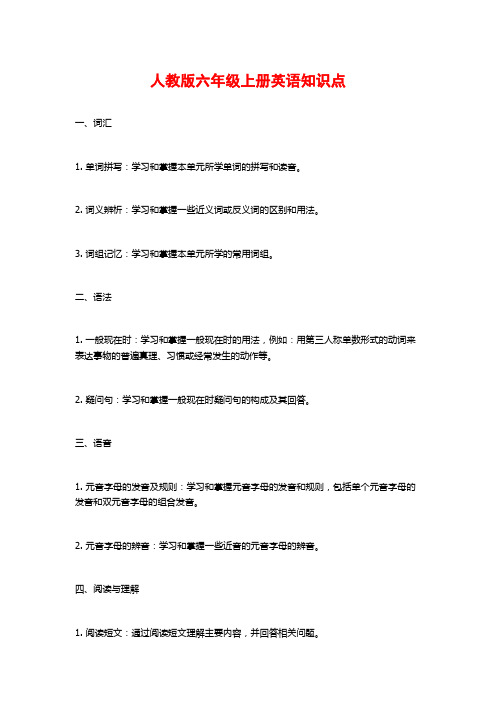
人教版六年级上册英语知识点
一、词汇
1. 单词拼写:学习和掌握本单元所学单词的拼写和读音。
2. 词义辨析:学习和掌握一些近义词或反义词的区别和用法。
3. 词组记忆:学习和掌握本单元所学的常用词组。
二、语法
1. 一般现在时:学习和掌握一般现在时的用法,例如:用第三人称单数形式的动词来表达事物的普遍真理、习惯或经常发生的动作等。
2. 疑问句:学习和掌握一般现在时疑问句的构成及其回答。
三、语音
1. 元音字母的发音及规则:学习和掌握元音字母的发音和规则,包括单个元音字母的发音和双元音字母的组合发音。
2. 元音字母的辨音:学习和掌握一些近音的元音字母的辨音。
四、阅读与理解
1. 阅读短文:通过阅读短文理解主要内容,并回答相关问题。
2. 根据上下文猜词义:通过上下文理解词义,并应用到具体的语境中。
五、写作
1. 填写单词:根据图片和提示填写单词,培养学生的观察力和动手能力。
2. 仿写句子:根据模板和相关词汇,进行句子仿写,培养学生的语言运用能力。
以上是人教版六年级上册英语的主要知识点概述,具体的知识点还需根据教材内容进行细化学习。
英语六年级上学期知识点
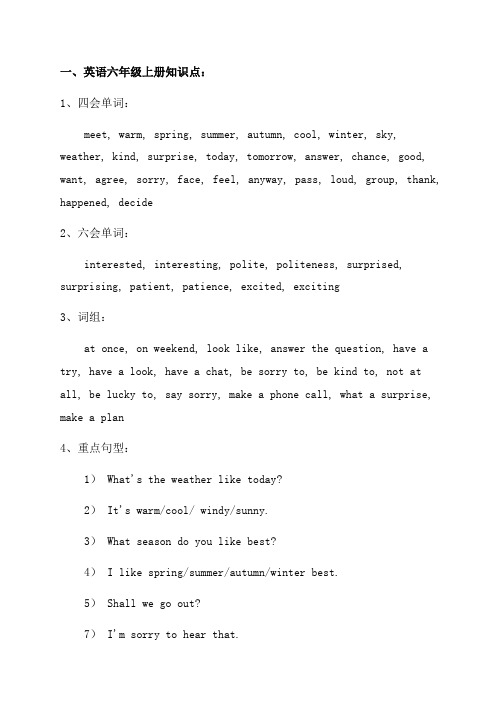
一、英语六年级上册知识点:1、四会单词:meet, warm, spring, summer, autumn, cool, winter, sky, weather, kind, surprise, today, tomorrow, answer, chance, good, want, agree, sorry, face, feel, anyway, pass, loud, group, thank, happened, decide2、六会单词:interested, interesting, polite, politeness, surprised, surprising, patient, patience, excited, exciting3、词组:at once, on weekend, look like, answer the question, have a try, have a look, have a chat, be sorry to, be kind to, not at all, be lucky to, say sorry, make a phone call, what a surprise, make a plan4、重点句型:1) What's the weather like today?2) It's warm/cool/ windy/sunny.3) What season do you like best?4) I like spring/summer/autumn/winter best.5) Shall we go out?7) I'm sorry to hear that.9) I'd love to.10) I agree with you.11) I disagree with you.12) What happened?13) Would you like to join us?14) I'm sorry, I can't.15) I'd like to have a try.16) It sounds exciting.17) What a surprise!18) Let's decide together.19) Let's make a plan.20) Shall we have a chat?二、六年级上册语法知识:1、紧缩形式:I'm = I amShe's = She isHe's = He isYou're = You are2、疑问句:Shall we go? 咱们去吗?Would you like to join us? 你想加入我们吗?What's the weather like today? 今天天气怎么样?What season do you like best? 你最喜欢哪个季节?3、情态动词:Can 能;可以Must 必须Mustn't 不可以Should 应该Shouldn't 不该4、动词的时态:一般现在时:表示动作发生的经常性或习惯一般过去时:表示动作已经发生以及有的结果5、There be 句型:There is a lake in the park. 公园里有一个湖There are many flowers in the garden. 花园里有许多花6、代词:I我You 你,你们He他She 她It它We我们They 他们7、祈使句:Let's go! 咱们走吧!Let's make a plan. 咱们来制定一个计划吧。
六年级英语上册 各单元重点知识 北京市版完美版

六年级英语上册各单元重点知识北京市版完美版Unit 1: Greetings and Introductions- Basic greetings: Hello, Hi, Good morning, Good afternoon, Good evening, How are you?- Introducing oneself: My name is..., I am..., Nice to meet you.- Asking and answering about age, hobbies, and families.Unit 2: Classroom Objects- Asking and answering questions about classroom objects: What is this? What is that?- Prepositions of location: in, on, under, between, next to.Unit 3: Daily Routines- Daily activities: wake up, get up, brush teeth, wash face, have breakfast, go to school, have lunch, do homework, go to bed.- Asking and answering questions about daily routines: What do you do in the morning? What time do you go to bed?- Time expressions: in the morning, in the afternoon, in the evening, at night.Unit 4: Fruits and Vegetables- Describing taste and preference: sweet, sour, like, dislike.- Countable and uncountable nouns: a/an, some.Unit 5: Numbers 1-100- Numbers 1-20: one, two, three, four, five, six, seven, eight, nine, ten, eleven, twelve, thirteen, fourteen, fifteen, sixteen, seventeen, eighteen, nineteen, twenty.- Numbers 20-100: twenty-one, twenty-two, thirty, forty, fifty, sixty, seventy, eighty, ninety, one hundred.- Counting objects and people.- Asking and answering about quantity: How many...?Unit 6: Colors- Basic colors: red, blue, green, yellow, orange, purple, pink, black, white.- Describing objects by their colors.- Expressions: What color is it? It is...Unit 7: Weather- Basic weather conditions: sunny, cloudy, rainy, snowy, windy.- Asking and answering questions about the weather: What is the weather like today? It is...- Expressions: It is hot/cold/warm.Unit 8: Clothes- Basic clothing items: shirt, pants, dress, skirt, hat, shoes.- Describing clothes: color, size.- Expressions: I am wearing..., He/She is wearing...以上是六年级英语上册各单元重点知识的概要内容。
六年级上册英语各单元知识点
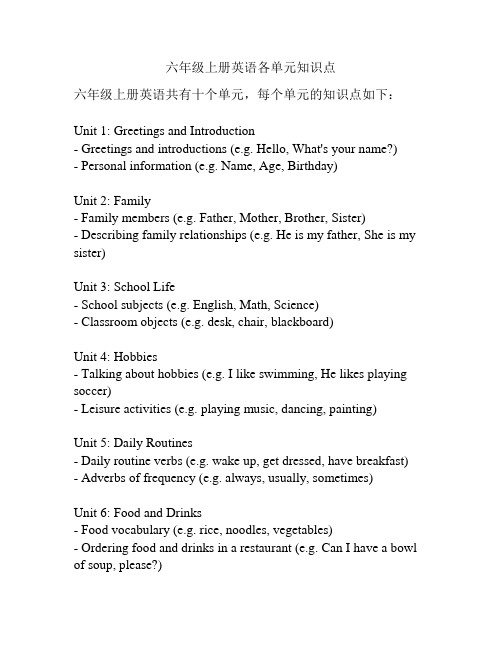
六年级上册英语各单元知识点六年级上册英语共有十个单元,每个单元的知识点如下:Unit 1: Greetings and Introduction- Greetings and introductions (e.g. Hello, What's your name?)- Personal information (e.g. Name, Age, Birthday)Unit 2: Family- Family members (e.g. Father, Mother, Brother, Sister)- Describing family relationships (e.g. He is my father, She is my sister)Unit 3: School Life- School subjects (e.g. English, Math, Science)- Classroom objects (e.g. desk, chair, blackboard)Unit 4: Hobbies- Talking about hobbies (e.g. I like swimming, He likes playing soccer)- Leisure activities (e.g. playing music, dancing, painting)Unit 5: Daily Routines- Daily routine verbs (e.g. wake up, get dressed, have breakfast) - Adverbs of frequency (e.g. always, usually, sometimes)Unit 6: Food and Drinks- Food vocabulary (e.g. rice, noodles, vegetables)- Ordering food and drinks in a restaurant (e.g. Can I have a bowl of soup, please?)Unit 7: Animals- Animal vocabulary (e.g. dog, cat, rabbit, bird)- Describing animals (e.g. It has four legs, It can fly)Unit 8: Weather- Weather vocabulary (e.g. sunny, rainy, windy, snowy)- Talking about the weather (e.g. It's hot today, It's raining outside) Unit 9: Clothing- Clothes vocabulary (e.g. shirt, pants, dress)- Describing clothing (e.g. It's red, She is wearing a hat)Unit 10: Festivals and Celebrations- Common festivals and celebrations (e.g. Christmas, New Year, Birthday)- Traditions and customs during these events (e.g. decorating a Christmas tree, giving gifts)These are the main knowledge points covered in the sixth grade English textbook. Additional grammar and vocabulary may be introduced along with these topics.。
六年级上册英语第一第二单元知识点
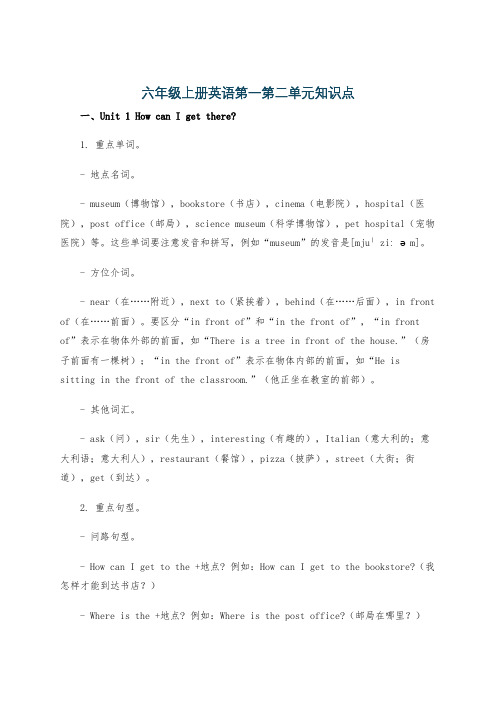
六年级上册英语第一第二单元知识点一、Unit 1 How can I get there?1. 重点单词。
- 地点名词。
- museum(博物馆),bookstore(书店),cinema(电影院),hospital(医院),post office(邮局),science museum(科学博物馆),pet hospital(宠物医院)等。
这些单词要注意发音和拼写,例如“museum”的发音是[mjuˈziːəm]。
- 方位介词。
- near(在……附近),next to(紧挨着),behind(在……后面),in front of(在……前面)。
要区分“in front of”和“in the front of”,“in front of”表示在物体外部的前面,如“There is a tree in front of the house.”(房子前面有一棵树);“in the front of”表示在物体内部的前面,如“He issitting in the front of the classroom.”(他正坐在教室的前部)。
- 其他词汇。
- ask(问),sir(先生),interesting(有趣的),Italian(意大利的;意大利语;意大利人),restaurant(餐馆),pizza(披萨),street(大街;街道),get(到达)。
2. 重点句型。
- 问路句型。
- How can I get to the +地点? 例如:How can I get to the bookstore?(我怎样才能到达书店?)- Where is the +地点? 例如:Where is the post office?(邮局在哪里?)- 指路句型。
- Turn left/right at +地点. 在……处向左/右转。
例如:Turn left at the second crossing.(在第二个十字路口左转。
六年级上册英语课本知识点总结(最新最全)
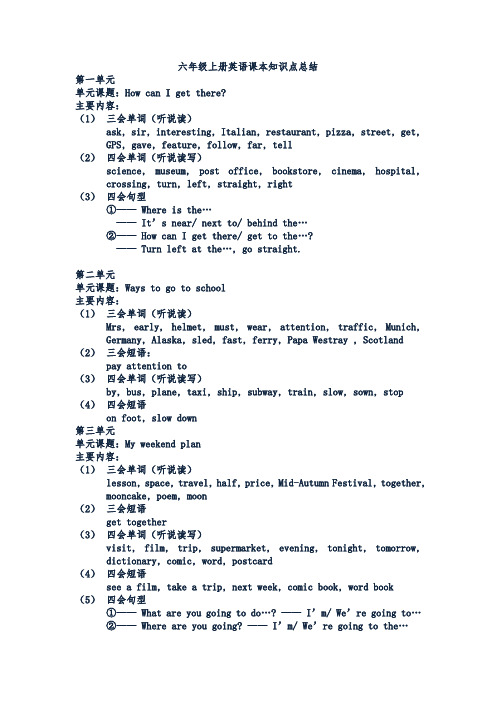
六年级上册英语课本知识点总结第一单元单元课题:How can I get there?主要内容:(1)三会单词(听说读)ask, sir, interesting, Italian, restaurant, pizza, street, get,GPS, gave, feature, follow, far, tell(2)四会单词(听说读写)science, museum, post office, bookstore, cinema, hospital,crossing, turn, left, straight, right(3)四会句型①—— Where is the…—— It’s near/ next to/ behind the…②—— How can I get there/ get to the…?—— Turn left at the…, go straight.第二单元单元课题:Ways to go to school主要内容:(1)三会单词(听说读)Mrs, early, helmet, must, wear, attention, traffic, Munich,Germany, Alaska, sled, fast, ferry, Papa Westray , Scotland (2)三会短语:pay attention to(3)四会单词(听说读写)by, bus, plane, taxi, ship, subway, train, slow, sown, stop (4)四会短语on foot, slow down第三单元单元课题:My weekend plan主要内容:(1)三会单词(听说读)lesson, space, travel, half, price, Mid-Autumn Festival, together, mooncake, poem, moon(2)三会短语get together(3)四会单词(听说读写)visit, film, trip, supermarket, evening, tonight, tomorrow,dictionary, comic, word, postcard(4)四会短语see a film, take a trip, next week, comic book, word book(5)四会句型①—— What are you going to do…? —— I’m/ We’re going to…②—— Where are you going? —— I’m/ We’re going to the…③— When are you going? ——(时间)第四单元单元课题:I have a pen pal主要内容:(1)三会单词(听说读)pen pal, hobby, jasmine, idea, Canberra, amazing, shall, goal, join, club, share(2)四会单词(听说读写)studies, puzzle, hiking(3)四会句型①—— What is ×××’s hobby? —— He/ She likes doing sth.②—— What are ×××’s hobbies?—— He/ She like doing, doing and doing sth.③—— Does he/ she…—— Yes, he/ she does. No, he/ she doesn’t.(4)重点语法点①动词的-ing形式,即like doing sth.表达喜欢做某事。
- 1、下载文档前请自行甄别文档内容的完整性,平台不提供额外的编辑、内容补充、找答案等附加服务。
- 2、"仅部分预览"的文档,不可在线预览部分如存在完整性等问题,可反馈申请退款(可完整预览的文档不适用该条件!)。
- 3、如文档侵犯您的权益,请联系客服反馈,我们会尽快为您处理(人工客服工作时间:9:00-18:30)。
Some smart people did.
last weekend, yesterday afternoon, on Friday morning,flew/drove/tookthe train toHangzhou, the Spring Festival Fair, the train stationby air/bus/subway/taxi/train, on foot,those vehicles, some smart people
句型:
What’s wrong with you?
Istood on my head.
Ihurt myself.
对于新句型What’s wrong with you?可以由已知句型What’s the matter?导入。
本单元的情感态度目标着眼于:安全运动、自我保护和合理膳食等。
Lesson 8“NowIcan read” 板块,对于学有余力的学生可以写一篇关于Little Piggy的短文。“NowIcan write”板块可以让学生给短文起一个恰当的题目。
Y, year, yellow baby, lucky stay, play by, fly, sky
词汇:身体部位词汇;动词过去式(规则和不规则变化)
句型:
G3U11
How are you today?
What’s the matter?
My head/leg/mouth hurts.
词汇:stand on your head,ache, terribly,kung fu,a blood test,scratch, upset, pill, stop doing
Unit 3
How did you go toHangzhou?
Travel
Talking about travelling
Where did you go last weekend?
We flew toHangzhou.
How did you go toHangzhou?
We went there by air.
六年级英语上册知识点版完美版
知识点
Unit
单元
Topic
话题
Function
功能
Structure
结构(语法)
Key vocabulary
词汇
L已知
(针对北师大版而言)
学生新知
教学提示
Unit 1
What did you do this summer?
Holidays
Z, zebra, zip, zipper
词汇:交通工具词汇;动词过去式(规则和不规则变化)
句型:
G5U2
What did you do yesterday?
I watched TV.
G4U10
How do you go to school?
I go by bus.
词汇:miss(错过),flight, passport, hotel, fantastic, silk, subway,bridge,sound,special,theSpring Festival Fair,invent,vehicles,smart,invention
Unit 2
What happened to your neck?
Illnesses
Seeing a doctor
Why did you stand on your head?
Because I wanted to practicekung fu.
What happened to you?
I hurt my right leg.
Talking about past events
What did you do this summer?
I went back toCanada.
When did you come back?
I came back last Thursday.
Did you go to see your grandparents?
句型:
No wonder you look stronger. It took only two hours by bus.
三个学习课“Let’s do”板块均是“听和写”相结合的教学。在“写”之前要进行充分的口语表达,最后进行书写练习。
Lesson 4 “NowIcan read” 板块是转述对话而成的短文。第一段转述的是Mike暑期的生活。结合Lesson 1,Lesson 3两课的对话内容。对于学有余力的学生可以写一篇玲玲暑假生活的短文。
X, X-ray, Xerox, box
词汇:动词过去式(规则和不规则变化)
句型:五上U2
What did you do yesterday?
I went to…
四下U9
When do you get up?
I get up at 7:00.
五上U3
Did you visit your grandparents?
Yes, I did. / No, I didn’t.
wrotea story,wentback to Canada,madecakes, came back,went tothe airport, finished the piano lessons, return the books,win the football match,last Thursday/Monday morning/week
Yes, I did. / No, t didn’t.
词汇:things, grandparents, just, learn, Peking Opera, no wonder, stronger , cousins, both, summer camp,return,finish,mountains,miss(想念)
What did you say?
I said you should stop eating too much.
stand on your head,practicekung fu,cry, felldown, go to hospital,cut finger,hurt, broke, scratched,eating too much, playing computer games, smoking
